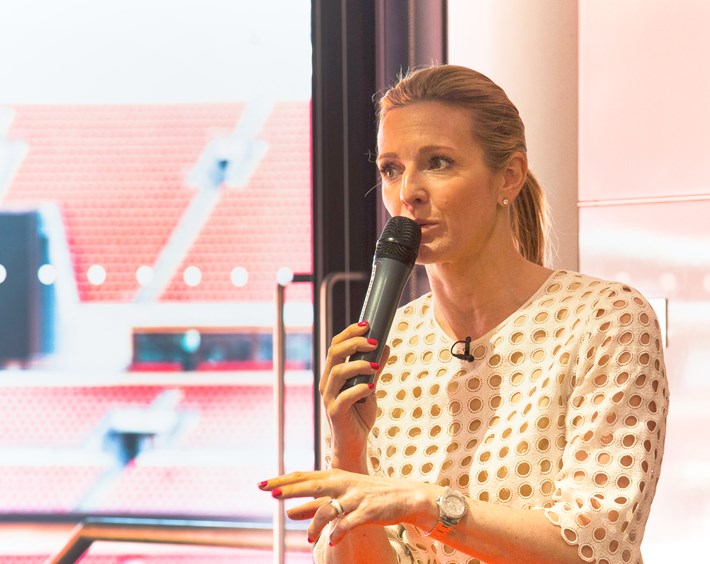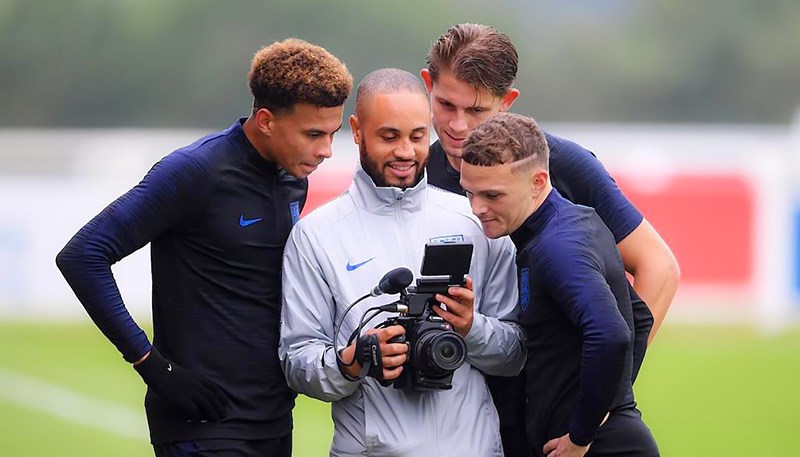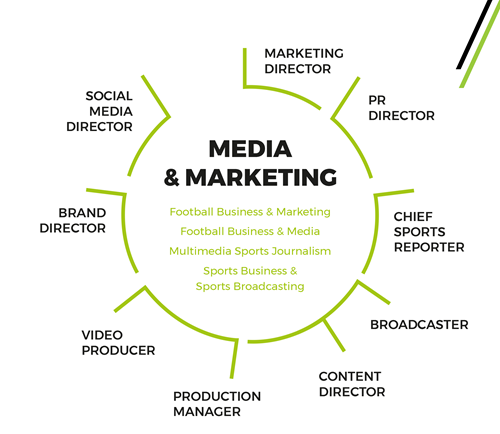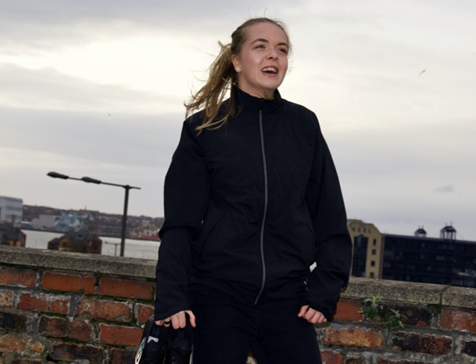Degree overview
On this degree programme, students will learn a range of digital and social media skills which enable sports journalists to tell stories across a range of platforms to reach a global audience.
This course is available with a Foundation year for those who do not meet main entry requirements. Please see ‘Modules’ and ‘Entry Requirements’ sections on this page for further information, including UCAS codes.

Degree content
Traditional print and broadcast sport journalism, while still powerful communications platforms, are being forced to adapt and change in order to survive in a new and rapidly-developing media environment. As a result, sport journalists are now expected to develop a range of digital and social media skills which enable them to tell a story across a number of platforms in order to reach a wider, often global, audience.
Students should graduate with a detailed understanding of social and digital sports media, media law and ethics, broadcast journalism, television production, online journalism and contemporary issues in sport media, among other key, relevant topics.
This degree aims to provide students with all the necessary skills and theoretical understanding to succeed in this new and exciting media age.
Teaching locations for this degree include:
In addition to our teaching locations, we also use specialist facilities throughout the academic year as well as additional facilities where required.

Be patient, and if you want to be a coach, journalist, marketer, lawyer or chief executive, learn the skills and someone will pay you to do it.
Modules
- Skills for Learning
- Mental Wealth
- Research Project
- Contemporary Issues in Sport
- Foundation of Media Practice
- Media Law and Application
- Industry Competencies (Mental Wealth)
- Introduction to Sports Journalism
- Social and Digital Sports Journalism
- Sports Media and Society
- Principles of Sports Journalism
- Introduction to Broadcasting
- Industry Readiness (Mental Wealth)
- Applied Digital Journalism
- Media Law and Ethics
- Research Methods
- Practising Sports Journalism
- TV Studio Production
- Professional Project
- Advanced Journalism Skills
- Sports Public Relations and Communications
- Industry Engagement (Mental Wealth)
- Digital Futures

University Campus of Football Business is an embedded college of the University of East London. All graduates that begin their degrees with UCFB from September 2021 onwards will receive a degree from the University of East London.
Click here to download the course specification
- QAA Subject Benchmark Statement for Communication, Media, Film and Cultural Studies (2019)
Visit the QAA website to access each of these benchmark statements.
Entry requirements
- UCFB Wembley course code: MSJF
- Institution: U10
- Campus: W
- UCFB Manchester Campus course code: MSJF
- Institution: U10
- Campus: E
- 64 UCAS tariff points or equivalent non-tariff qualifications
- GCSE Maths and English Language (Grade C/4 or above) or equivalent e.g. Functional Skills Level 2
- International applicants will be asked to pass the Academic IELTS test with a minimum overall score of 6.0 and no less than 5.5 in each of the four elements
All applications are reviewed on a case by case basis. If your academic achievements do not meet the minimum level required but you have considerable professional experience, please contact admissions@ucfb.com.
Please be aware that all applicants who do not hold British or Irish nationality will require a visa to study in the UK.
Our access to a UK Government Student Visa licence is currently being reviewed. This means we are unable to consider applications from any applicant who would require a student visa to study in the UK as we cannot issue a Confirmation of Acceptance for Studies (CAS).
If you are unsure whether you would need a visa to study in the UK, or for more information, please contact compliance@ucfb.com.
If you don’t hold a visa for the UK and would still like to study with UCFB, please consider Football Coaching (Distance with Attendance).
- UCFB Wembley course code: MSJ1
- Institution: U10
- Campus: W
- UCFB Manchester Campus course code: MSJ1
- Institution: U10
- Campus: E
- 112 UCAS tariff points or equivalent non-tariff qualifications
- GCSE Maths and English Language (Grade C/4 or above) or equivalent e.g. Functional Skills Level 2
- International applicants will be asked to pass the Academic IELTS test with a minimum overall score of 6.0 and no less than 5.5 in each of the four elements
All applications are reviewed on a case by case basis. If your academic achievements do not meet the minimum level required but you have considerable professional experience, please contact admissions@ucfb.com.
Please be aware that all applicants who do not hold British or Irish nationality will require a visa to study in the UK.
Our access to a UK Government Student Visa licence is currently being reviewed. This means we are unable to consider applications from any applicant who would require a student visa to study in the UK as we cannot issue a Confirmation of Acceptance for Studies (CAS).
If you are unsure whether you would need a visa to study in the UK, or for more information, please contact compliance@ucfb.com.
If you don’t hold a visa for the UK and would still like to study with UCFB, please consider Football Coaching (Distance with Attendance).
We accept applications with advanced standing via our Advanced Prior Learning (APL) application process. Should you wish to apply for direct entry into Year 2 or Year 3 of one of our undergraduate degree programmes, you will be required to complete an APL application form and provide us with evidence of your previous studies.
Please contact admissions@ucfb.com for further detailed guidance. Please note that should you wish to apply via this process, we strongly encourage you to begin the application process early in the cycle and you will still be required to complete a UCAS application.
All applications for an undergraduate degree programme are submitted via UCAS. To apply, please visit UCAS.com.
Career prospects
Career prospects for graduates of the BA (Hons) Multimedia Sports Journalism degree programme at UCFB include roles such as a sports reporter for a local newspaper; a dedicated sporting website; a regional television station or a regional radio station. Opportunities also exist within the media offices of sports organisations.

Over 90% of UCFB graduates are in employment within six months of graduating and almost two-thirds of them work within the global sports industry.
At UCFB we bridge the gap between education and business, allowing a unique approach to education. We provide two curricula; the academic curriculum which encompasses exams and coursework and the Employability & Career Planning programme – a three year journey of professional and personal development.
This provides access to best-in-class industry guest speakers, additional qualifications and exceptional opportunities to apply for work experience placements to ensure our students graduate as well-rounded, empowered professionals.
Find out more about your career journey at UCFB

Each of our UCFB undergraduate degrees is underpinned by an embedded strand of learning and skills development, including a formalised a short work-placement opportunity, to better equip students for the 21st century workplace and enhance employability opportunities.
This allows students to develop a set of key transferrable skills to ensure they are ready for the modern workplace when they graduate, including emotional, social, physical, cultural and cognitive intelligence, digital proficiency, industry and community connections, and giving back to the community through projects and volunteering.
Every UCFB degree has one Mental Wealth module in each academic year to cover these skills, and our learning outcomes for all modules are closely mapped to these same competencies in order to maximise graduate's industry readiness and career opportunities.
While most final-year students prepare for exams and dissertations, UCFB’s Georgia Stevens prepares to play professionally with Coventry United – however she’s still studying for her degree!
Read more
Tuition fees for 2024 entry
Visit our dedicated page about fees and student finance.
The provision of a facility or service including accommodation may be subject to an additional charge (i.e. separate from tuition fees). Where this is the case, we will make this clear in advance and payment for such service shall be made in accordance with any additional contract made between you and the University.
In some instances, optional activities provided by UCFB may carry an additional cost for participants (e.g. qualifications with external certification such as FA Coaching Badges). Any additional costs will be provided to students in advance of any such sessions running.
Students may need to buy a storage device, such as an SD card, to host their material in the broadcast modules in year two of the course. Costs for a SD or similar depend on the memory size. A typical 32GB card will cost around £10.
UCFB has a range of scholarship and bursary options to help with the cost of studying and to encourage students to embrace their time at UCFB and graduate with more than just their university degree. Click here to learn more.

UCFB provides an exceptional environment to live and learn in, with state-of-the-art facilities in two inspirational campuses in London and Manchester.
Find out more

















